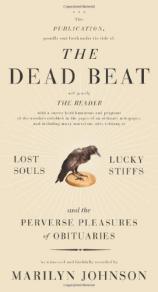The Dead Beat: Lost Souls, Lucky Stiffs, and the Perverse Pleasures Of Obituaries
Review
The Dead Beat: Lost Souls, Lucky Stiffs, and the Perverse Pleasures Of Obituaries
It wasn't so long ago, Marilyn Johnson writes, that the job of
writing newspaper obituaries was "a holding pen for broken-down
journalists and young reporters who needed to be broken in."
Exactly so. I say that as one who wrote many hundreds of "obits"
over a career on three newspapers. In fact I'm not quite so sure as
Johnson seems to be that on most newspapers that situation doesn't
still prevail.
Nonetheless, her breezy little book makes an entertaining case for
obit writing as both journalism and literature. She has hunted down
leading practitioners of the art in both the United States and
Britain, brought them to idiosyncratic life, and given us many
delightful samples of their best work.
Their varied views on why obits are an important element in the
daily grind of newspaper work are illuminating. Depending on whom
you ask, obits are "the most creative writing in journalism," a
"competitive sport," a "folk art," the "undergrowth of history," or
--- my favorite --- "the Irish sports pages." The actress Elizabeth
Taylor called a premature obit on herself that somehow got
published "the best reviews I ever got."
One recurring theme in Johnson's book is the good obit writer's
ability to make the lives of ordinary folks as interesting --- even
more interesting --- than those of the rich and famous.
I remember a newspaper colleague of mine once complaining about how
hard it was to write an obit on someone "whose only accomplishment
was that he breathed successfully for 85 years." One of Johnson's
subjects summarizes the knack in one sentence: Who would you miss
more, the Secretary of State or your garbageman? So she celebrates
those who troll for the illuminating detail that brings a departed
character to life: What was his/her favorite food? Was this person
good at Scrabble? What was his taste in clothes?
Johnson's writer-heroes are people you have probably never heard
of. The biggest name in American obit writing was one Jim Nicholson
of the Philadelphia Daily News, who gets a chapter all to
himself. Then Johnson crosses the Atlantic to celebrate three or
four of London's best, notably Andrew McKie of the Daily
Telegraph. British obits she finds generally better than the
American variety --- more idiosyncratic, more informal, more shaped
by the writer's own personality.
The reader is fascinated to find that these unsung American
journalistic dealers in death have a formal society of their own,
complete with annual meeting get-togethers. They were in conclave
assembled in a dusty New Mexico town in 2004 on the very day of
Ronald Reagan's death, which set off an instant frenzy of
professional activity. You get the impression that they were rather
grateful to the former President.
Johnson finds a mine of material in the response of American
newspapers to the 9/11 terrorist attacks, notably the celebrated
"Portraits of Grief" series in which the New York Times
sought to memorialize every last one of the nearly 3,000 dead.
These were not conventional obits, of course. They were briefer,
less exhaustive, more personal snapshots than formal
sendoffs.
Her own prose is bright and quotable. It is no easy task to write
an entertaining book on such a rather morbid subject, but she has
turned the trick nicely. And readers will be grateful too for her
sportsmanship in including so many splendid examples of
obit-writing at its best from the pens of her subjects.
And by the way, did I ever tell you about the obit I once wrote
about the former mayor of a small Massachusetts city whose
political career had ended abruptly because his wife of many years
publicly announced that they had never been actually married?
Reviewed by Robert Finn (Robertfinn@aol.com) on December 29, 2010
The Dead Beat: Lost Souls, Lucky Stiffs, and the Perverse Pleasures Of Obituaries
- Publication Date: March 1, 2006
- Genres: Cultural Studies, Nonfiction
- Hardcover: 256 pages
- Publisher: HarperCollins
- ISBN-10: 0060758759
- ISBN-13: 9780060758752





